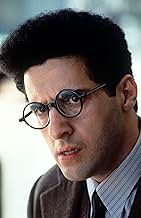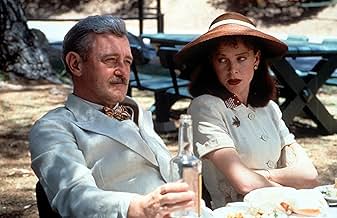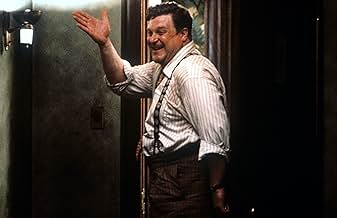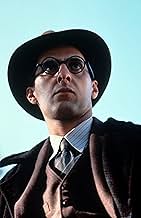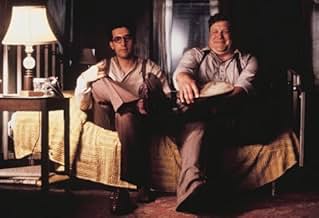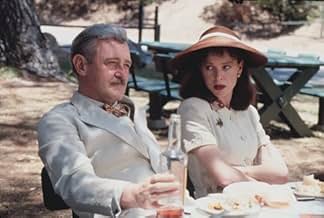Ein renommierter New Yorker Bühnenautor lässt sich von einem Angebot nach Kalifornien locken, um dort für den Film zu arbeiten, und lernt dabei die infernalischen Abgründe Hollywoods kennen.Ein renommierter New Yorker Bühnenautor lässt sich von einem Angebot nach Kalifornien locken, um dort für den Film zu arbeiten, und lernt dabei die infernalischen Abgründe Hollywoods kennen.Ein renommierter New Yorker Bühnenautor lässt sich von einem Angebot nach Kalifornien locken, um dort für den Film zu arbeiten, und lernt dabei die infernalischen Abgründe Hollywoods kennen.
- Regie
- Drehbuch
- Hauptbesetzung
- Für 3 Oscars nominiert
- 19 Gewinne & 29 Nominierungen insgesamt
Meagen Fay
- Poppy Carnahan
- (as Megan Faye)
Empfohlene Bewertungen
You are either going to love or hate this one, and I doubt you'll know which until it's over. Maybe you won't know even then.
In 1941, Barton Fink (John Turturro) is a successful Broadway playwright. Now that he's got some success under his belt, he says he wants to write plays for "the common man". But his agent has a tempting offer. A movie studio wants him to come to LA and write screenplays for 1000 dollars a week. The agent convinces him to go. Barton checks into the Hotel Earle, which has ornate decorations in the common areas, but is a dump from the standpoint of Barton's room. The heat has the wallpaper peeling off the walls. The sole decoration in Barton's room is the picture of a woman sitting on the beach, her arm raised to block the sun. Remember this picture - it's important.
Barton's first assignment is to write a "wrestling picture" starring Wally Beery. But Barton has writer's block for assorted reasons, one of them being that he knows nothing about this subject. So he stares at his typewriter with the dread an insomniac might stare at his bed. But then what seemed to start out being a film about how the studio system can beat the creativity and the confidence out of a successful writer changes course and becomes something that is completely surreal and even nightmarish by the end. I can really say nothing more specific than that without giving things away.
The Coens wrote Barton Fink when they were having writer's block trying to write Miller's Crossing because of the complexity of the plot. So did they manage to pack lots of symbolism into a tight, coherent package, or did they simply let their imagination run wild and undisciplined in an attempt to get back on track on the other film? I have no idea. I just know that I like it and - for me - it's great for repeat viewings.
One more thing - How can it be so hot in LA, and then suddenly WWII has started, which would make it December? Why is it Barton doesn't seem to notice WWII has started without being told and then really has no reaction. He really isn't plugged into "the common man" is he?
In 1941, Barton Fink (John Turturro) is a successful Broadway playwright. Now that he's got some success under his belt, he says he wants to write plays for "the common man". But his agent has a tempting offer. A movie studio wants him to come to LA and write screenplays for 1000 dollars a week. The agent convinces him to go. Barton checks into the Hotel Earle, which has ornate decorations in the common areas, but is a dump from the standpoint of Barton's room. The heat has the wallpaper peeling off the walls. The sole decoration in Barton's room is the picture of a woman sitting on the beach, her arm raised to block the sun. Remember this picture - it's important.
Barton's first assignment is to write a "wrestling picture" starring Wally Beery. But Barton has writer's block for assorted reasons, one of them being that he knows nothing about this subject. So he stares at his typewriter with the dread an insomniac might stare at his bed. But then what seemed to start out being a film about how the studio system can beat the creativity and the confidence out of a successful writer changes course and becomes something that is completely surreal and even nightmarish by the end. I can really say nothing more specific than that without giving things away.
The Coens wrote Barton Fink when they were having writer's block trying to write Miller's Crossing because of the complexity of the plot. So did they manage to pack lots of symbolism into a tight, coherent package, or did they simply let their imagination run wild and undisciplined in an attempt to get back on track on the other film? I have no idea. I just know that I like it and - for me - it's great for repeat viewings.
One more thing - How can it be so hot in LA, and then suddenly WWII has started, which would make it December? Why is it Barton doesn't seem to notice WWII has started without being told and then really has no reaction. He really isn't plugged into "the common man" is he?
I am absolutely amazed at the fantastic taste of the imdb readership, having loved this film for years and always been told by people I'd told about it and persuaded to watch that it was no good, I finally find some other people out there who love it as much as me, posting (mostly) extremely positive comments...This is a fabulous film, dripping with a brooding, sticky atmosphere that draws you in to the clammy world of Barton Fink, sat in his hotel room listening to the creaking of the wallpaper as it dribbles moistly from the walls, searching for inspiration in his tacky painting and dusty typewriter...Perhaps it is a little dark for some tastes, but as black comedy goes this is the blackest and the most biting there is, the Hollywood system and New York theatrical snobbery lampooned with equal viciousness. Deep insight into the nature of the creative spirit, a plethora of fine performances bringing at first stereotypical characters to full life (despite the unreal, fable-like atmosphere created by the slimy, glistening colours reminiscent of the films of Jeunet&Caro...), and many moments of hilarity make this a perfect movie, one I would not hesitate in recommending to anyone despite the fairly high probability they will hate it. A lack of any underlying morality, an absence of absolutes of right and wrong, good and bad, give this film a unique feeling that it could go anywhere. The last twenty minutes are about the most powerful I have ever seen in anything, at the end of almost every scene I thought it could end there and be an amazing film, yet each further scene only added further depth and poignancy. The first time I saw it, it left me drained, mind spinning, hands shaking, barely able to reach for the remote to rewind it to watch it again...
I knew I was entering the world of the insane when I picked this up. I wasn't disappointed. This is a dark comedy where people don't talk to each other, they just talk. Barton Fink is a big phony one hit wonder. He has these high ideals which he really doesn't understand. He's unable to see the forest for the trees. When he meets John Goodman's character, Charlie, he has an opportunity to find his muse, but he doesn't even listen. When he does, it's too late. The events of this film are wonderful, from Barton's speeches and his block. To Mayhew, the ersatz Faulkner, who drinks constantly and screeches. Barton Fink is so unlikeable that we don't even care what happens to him in other than a casual way. Goodman steals every scene he is in and ends up so much more that originally thought. This is a movie about taking everything to a higher pitch. It's about the artist and the dilettante. It's about the movies being a purely commercial enterprise. Wallace Beery is the king of the screen. It's a wrestling movie. For God's sake, they're asking for so little. Barton Fink is a whiny loser and he pays the price. The Coens are, without a doubt, the most refreshing thing of the last two decades.
Re-watching this after I guess decades?
I enjoyed it but not overwhelmingly so. I think less than when i originally watched.
However I am reading, with amusement, the other reviews on here. They go on and on about how the movie skewers Hollywood and New York elites. No it doesn't. Instead this movie is dead simple: a playwright who says he is for the common man (and I mean man) is not really so. He is more interested in being seen as the great artist.
How do we see this?
He comes out to Hollywood and goes on and on in front of John Goodman about how he is for he common man while ignoring what Goodman had to say. Goodman repeated three times how he had stories to tell and Fink just ignored him.
Fink is more interested in himself as the great writer than actually focusing on the ask: write a wrestling movie, don't overthink it, write something similar to what others have done.
How do we see this? He insists on staying in a fleabag hotel as a sort of hairshirt to goose his artistic suffering and therefore creativity. But he doesn't need that creativity as he has been asked to write a straightforward wrestling movie in the style of past movies.
He could have stayed in a fancy hotel, enjoyed the lifestyle and written the wrestling movie.
Oh and those Hollywood elites? What the same ones who want to put out a wrestling movie that the public loves. Some elites huh!
I enjoyed it but not overwhelmingly so. I think less than when i originally watched.
However I am reading, with amusement, the other reviews on here. They go on and on about how the movie skewers Hollywood and New York elites. No it doesn't. Instead this movie is dead simple: a playwright who says he is for the common man (and I mean man) is not really so. He is more interested in being seen as the great artist.
How do we see this?
He comes out to Hollywood and goes on and on in front of John Goodman about how he is for he common man while ignoring what Goodman had to say. Goodman repeated three times how he had stories to tell and Fink just ignored him.
Fink is more interested in himself as the great writer than actually focusing on the ask: write a wrestling movie, don't overthink it, write something similar to what others have done.
How do we see this? He insists on staying in a fleabag hotel as a sort of hairshirt to goose his artistic suffering and therefore creativity. But he doesn't need that creativity as he has been asked to write a straightforward wrestling movie in the style of past movies.
He could have stayed in a fancy hotel, enjoyed the lifestyle and written the wrestling movie.
Oh and those Hollywood elites? What the same ones who want to put out a wrestling movie that the public loves. Some elites huh!
Watched the film, understood 60% of it. Went to read its reviews after, understood 75% of it. Now i have to watch it again from another angle to completely get it. This is what the Coen brothers make you do.
Wusstest du schon
- WissenswertesThe first film to win all three major awards (Palme D'or, Best Director, and Best Actor) at the Cannes Film Festival. Also, it was unanimously chosen for the Palme D'or.
- PatzerBriefly visible at the top of the screen when Detective Mastrionotti introduces himself to Barton.
- Zitate
Charlie Meadows: Look upon me! I'll show you the life of the mind!
- Crazy CreditsThe 20th Century Fox logo appears over silence; the "fanfare" is not played.
- VerbindungenEdited into The Clock (2010)
- SoundtracksFor Sentimental Reasons
by Edward Heyman, Al Sherman and Abner Silver
Licenced with Permission the Successors of Marlo Music Corporation (ASCAP)
Top-Auswahl
Melde dich zum Bewerten an und greife auf die Watchlist für personalisierte Empfehlungen zu.
Details
- Erscheinungsdatum
- Herkunftsländer
- Sprache
- Auch bekannt als
- Бартон Фінк
- Drehorte
- Produktionsfirmen
- Weitere beteiligte Unternehmen bei IMDbPro anzeigen
Box Office
- Budget
- 9.000.000 $ (geschätzt)
- Bruttoertrag in den USA und Kanada
- 6.153.939 $
- Eröffnungswochenende in den USA und in Kanada
- 268.561 $
- 25. Aug. 1991
- Weltweiter Bruttoertrag
- 6.154.231 $
- Laufzeit
- 1 Std. 56 Min.(116 min)
- Farbe
- Sound-Mix
- Seitenverhältnis
- 1.85 : 1
Zu dieser Seite beitragen
Bearbeitung vorschlagen oder fehlenden Inhalt hinzufügen




